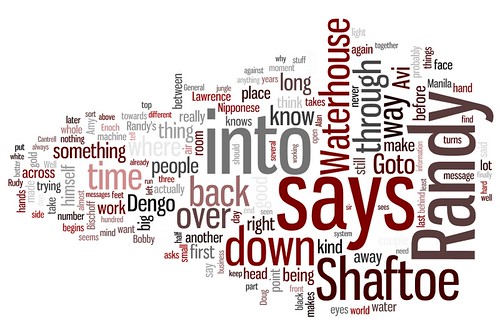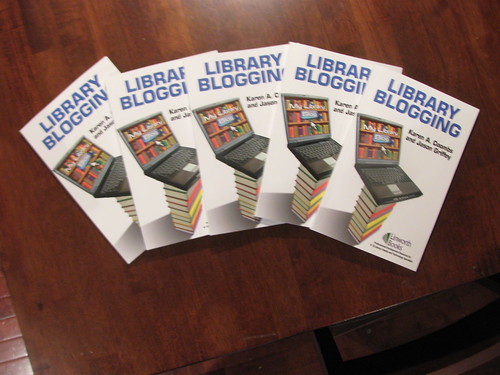Just a note for those that might have missed it…I’m one part of a three part post over at TechSource on the Kindle 2 and libraries. I’m pointing it out mainly because of the fact that I did the very first, I think, video for TechSource, showing off the Kindle 2’s Text-to-Speech feature. Go take a look, and let me know how you think it came out.
Category: Books
I’m in the middle of writing a book about Mobile Technologies and Libraries, and am researching libraries providing mobile-specific services of all sorts. I came across the University of Virginia’s Ebook Library, and decided to take a look at what they are offering. It’s a very old ebook collection, with the original Etext division starting in 1992. Here’s the part that made me scratch my head…it’s in their Access and Conditions of Use:
While many of these items are made publicly-accessible, they are not all public domain — the vast majority of the images, and a number of the texts, including all of those from the University of Virginia Special Collections Department, are copyrighted to the University of Virginia Library, for example, and a number of other texts are still copyrighted to their original print publishers and made available here with permission.
I have no qualms with the texts that are copyrighted by their original publishers, and that UVA got permission to use. My eyebrows raise at the bit about “including all those from the University of Virginia Special Collections Department, are copyrighted to the University of Virginia Library…”
Really?
I had my suspicions here…it’s not like the UVA Special Collections Department are writing books, right? After look around, I found this text: Po’ Sandy by Charles W. Chestnutt. Published in 1888 in the Atlantic Monthly in New York, it is clearly in the public domain in the United States. But there it is, in the front matter:
Copyright 1999, by the Rector and Visitors of the University of Virginia
Looking around just a bit, it looks like this shows up on all sorts of texts that UVA digitized. My favorite is The Autobiography of Benjamin Franklin, completed in 1788 by Franklin but the particular version republished by UVA was published in 1909 by P. F. Collier & Son Company in New York. Also, without any doubt, in the Public Domain in the US. It also has the note:
Copyright 1999, by the Rector and Visitors of the University of Virginia
What gives UVA the right to claim copyright on these texts? They couldn’t have legally digitized them if they weren’t in the Public Domain at the time of their digitization, and changing the form of something doesn’t give you the right to claim a copyright, especially on the bits that make the work up. Even stranger, they aren’t just claiming copyright, but including a EULA!
By their use of these ebooks, texts and images, users agree to follow these conditions of use:
- These ebooks, texts and images may not be used for any commercial purpose without permission from the Electronic Text Center.
- These ebooks, texts and images may not be re-published in print or electronic form without permission from the Electronic Text Center. However, educators are welcome to print out items and hand them to their students.
- Users are not permitted to download our ebooks, texts, and images in order to mount them on their own servers for public use or for use by a set of subscribers. Individuals and institutions can, of course, make a link to the copies at UVa, subject to our conditions of use.
Really? Is UVA asserting rights here that they just do not have? Not permitted to republish? Only if there is a copyright concern…which I think that UVA is asserting incorrectly here. It’s possible that there is some piece of copyright law that they are leaning on for these claims, but on the face of it, this seems like over reaching. Can anyone explain to me how they could possible have legitimate copyright claims on things that they didn’t create and are beyond the time limit for copyright protection in the US?
Ebooks explode this week
This week, ebooks were all over the tech news, and there were at least two huge announcements. Well, one announcement, and one not-so-secret launch coming Monday.
The announcement was the Google Book mobile service, which gives users access to 1.5 million books from the Google Book scanning project OCR’d and formatted for mobile screens, like those of the G1 and the iPhone. In one fell swoop, Google has made these platforms the home of the largest electronic book library in the world…the Amazon Kindle store currently has 230,000 books, while Project Gutenberg has just over 100,000.
The upcoming announcement is that almost certainly on Monday, Amazon will announce the Kindle version 2. Leaked photos make the v2 look sleeker, more updated, and with much better physical form-factor. What I’m most excited about is the possibility of v.2 of the software, which better UI and possibly more features. As long, of course, as the software is ported back to the original hardware.
Are these the things that will finally push ebooks firmly into the public consciousness? Time will tell, but I can hope.
Robert Heinlein famously said:
A human being should be able to change a diaper, plan an invasion, butcher a hog, conn a ship, design a building, write a sonnet, balance accounts, build a wall, set a bone, comfort the dying, take orders, give orders, cooperate, act alone, solve equations, analyze a new problem, pitch manure, program a computer, cook a tasty meal, fight efficiently, die gallantly. Specialization is for insects.
In the spirit of the myriad “25 random facts” and such, I’m going to suggest that we see how close some of us are to Heinlein’s ideal. Here’s the quote again, with things I’ve actually done in bold, things I think I could do in italics, and things I can’t do in regular type:
A human being should be able to change a diaper, plan an invasion, butcher a hog, conn a ship, design a building, write a sonnet, balance accounts, build a wall, set a bone, comfort the dying, take orders, give orders, cooperate, act alone, solve equations, analyze a new problem, pitch manure, program a computer, cook a tasty meal, fight efficiently, die gallantly.
I must admit, I’ve never actually butchered a hog, but I’ve seen it done, and I’ve butchered both deer and squirrel, and I’ve dissected everything from a small pig to rats and mice. So I think I could handle that. I’m helping to design a library right now, so I think that counts. And yes, I’ve shoveled manure in my time…cleaning out barn stalls.
So I still need to figure out how to conn a ship, fight efficiently, and die gallantly. I’m pretty sure I could plan an invasion, but don’t really want to find out. I’ve never built a wall, but I understand basic physics, so I think I’m good there. I’ve taken umpteen first aid classes, and had extensive physiology/anatomy classes, so setting a bone could be done, I’m pretty sure. Fighting and dying are both not really something I want to try out. But that’s not too bad a reckoning, right?
Reflecting on the Kindle
I have a new post up on ALA Techsource regarding my take on the Kindle, and what I think of it after living with it for 6 months.
Click on over and take a look, and leave a comment, especially if you have a Kindle as well!
So in a pretty convoluted story with a straightforward beginning, Amazon has announced that it will be purchasing the social book network Shelfari. Just last month, Amazon also purchased AbeBooks…which is a minority investor in LibraryThing.
*boggle*
So Amazon buys a competitor to a service that they, in effect, already own part of. I can see them wanting Shelfari for the interface, especially as part of a “next generation” Kindle device. But Shelfari doesn’t have much else for Amazon to want, honestly…Shelfari relies on the Amazon book data to begin with, so they don’t have any data that will improve Amazon in any way (except the little bit of social data that can be scraped from the site).
There’s a long discussion about this over on LibraryThing, where Tim is talking the thing out in his open and transparent style. I don’t think this is going to hurt LibraryThing at all…they have better book data, for one, and Amazon now has to fit Shelfari into its systems, which will take a looooong time.
Has anyone seen a value given for the Shelfari acquisition? I’m curious what Amazon paid for them.
Here’s hoping this doesn’t cause Tim too many sleepless nights.
 How broken is copyright in the US? So broken that if you look at two different books, both published by the same publisher (Dodd, Mead & Co.), in the same year (1940), both with copyright notices, and neither with a copyright renewal…one is currently protected by copyright, and the other is in the public domain.
How broken is copyright in the US? So broken that if you look at two different books, both published by the same publisher (Dodd, Mead & Co.), in the same year (1940), both with copyright notices, and neither with a copyright renewal…one is currently protected by copyright, and the other is in the public domain.
An amazing article by Peter B. Hirtle entitled Copyright Renewal, Copyright Restoration, and the Difficulty of Determining Copyright Status outlines this case, and others that are equally frustrating. Fascinating stuff, and shows how truly broken intellectual property laws are in the current market, with the necessity of international reciprocation and ever-increasing ridiculous time limits. Not to mention that the very model is now shattered with the digital revolution…even without the digital, copyright needs an overhaul. With it? It needs cleansed with fire.
Pick a random book in your library that was published between 1923 and 1964, and check this chart, and see if you can tell if it’s still protected. Now multiply that by a few ten million books, and see what kind of crazy legal situation our legislatures have gotten us into.
Cryptonomicon via tag cloud
Two tag cloud posts in a row is a bit much, but I had the idea, so I went with it. This is an infographic of the word frequency of the text of the novel Cryptonomicon by Neal Stephenson.
It’s a really interesting way to visualize texts (as I’ve pointed out before). So let’s see if I can start a meme. Doesn’t have to be a new book, you can pick one from Project Gutenberg…there certainly are enough good books there. Pick your favorite (or one of your favorites), and post it up.
I’m tagging: Iris, Amanda and Tombrarian.
Library Blogging
It’s here! It’s really here! For more news about the book, and general updates and such, visit the blog for the book: Library Blogging. I’ll talk more after I’ve had a chance to review it again, but so far it looks great.
For those going to ALA, Linworth Publishing is booth #2553, if you want to stop by and pick up a copy of the book.
Kindle in flames?
Two days before I received my Kindle, Roy Tennant published an article on his Digital Libraries blog entitled “Prediction: The Kindle goes down in flames“. I normally agree with Roy on lots of things, but this is a topic where I’m going to pick on him a little.
Let’s rewind to October of 2001, where a plucky little company named Apple released a strange new product called an iPod. With 5 gigabytes of storage, this pocket-sized marvel cost….$399. What did it do? It played music. That’s all it did. Moreover, it only connected to your computer via an esoteric plug called “Firewire” that 90% of the personal computers in the world didn’t have.
It took Apple 3 financial quarters to sell over 200,000 of them, and it wasn’t until 2004 and the cost per gigabyte dropped under $20/GB and the iPod was on it’s third generation that sales really took off.
The Kindle, for all the publicity it has garnered, is only 8 months old. Is it the perfect reading device? I’m not sure yet. I’ve been consuming ebooks for years, beginning with reading them on my Handspring Visor Deluxe in mid-2000. I’ve read them on cell phones, computer screens, and other PDA’s. And I can say without any reservation that after 24 hours with the Kindle that it is a completely new and better reading experience.
The advantages for the Kindle are twofold: a device customized for reading makes reading easier, and the device comes from Amazon. The Kindle is great for reading, not suffering from the issues that, for example, the iPhone might…primarily the issue that an LCD screen just isn’t very good for reading in any form of bright light. The device is driven by Amazon, who has the reach and power in the publishing industry to get books for the device (take a look at the difference between any other ebook provider’s numbers and Amazon’s). Amazon also has the infrastructure to support immediate electronic delivery of any ebook they carry, directly to the device. Anyone else doing that?
The Kindle does several things (it does not, contrary to Tennant’s assertion “only read books”). It allows for reading, annotating, bookmarking, dictionary lookup, and other common reading chores. It also comes with permanent free cellular internet service. Amazon Whispernet gives you, while not a full web experience, a browser and access to the ‘net anywhere you can get a Sprint cell signal. For no additional cost past the cost of the device. Seriously, how much is that worth over a year?
With all that said, I’ve only had the Kindle for less than 48 hours. I wasn’t going to buy one so early in the development cycle, but do I regret having one now? Hell no. It’s a marvelous piece of technology for readers, and I fully expect that in a couple of years I’ll still be toting it around from conference to conference in lieu of a few pounds worth of wood pulp.
If anyone wants to take a look at the Kindle, find me at ALA Annual, and I’ll happily let you play with it. Just holding it, seeing the screen, and seeing how much thought went into the design will make a difference, I promise.
Steve Lawson, in the comments, pointed out something that I wanted to address. Tim O’Reilly, in a comment on Roy’s post, says:
“I also struggle with Amazon’s DRM and sole-source approach, which seems to me to be a flawed copy of Apple’s iPod strategy, missing not only Apple’s brilliant design but also the positive externality that consumers could easily add their own music collection to the device by ripping mp3s.â€
I am no fan of DRM, and I admit that it gives me pause regarding the Kindle. That said, the “sole-source” approach isn’t true…the Kindle happily ingests any .mobi file you want, and there are plenty of places sourcing native Kindle files of public domain books. First thing I did was put a few dozen of my favorite classics on there, for free. As well, if I had an easy way to digitize the books I already own (in the same rough manner of the digitization of my CDs) I would be doing it, and adding them. The issue there isn’t with the Kindle, it’s that there is no easy digitization of dead trees.

